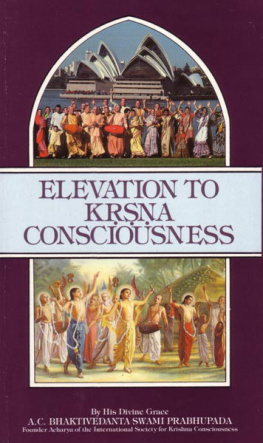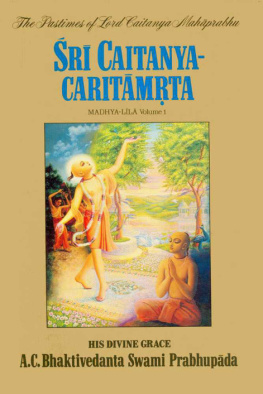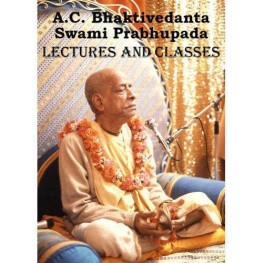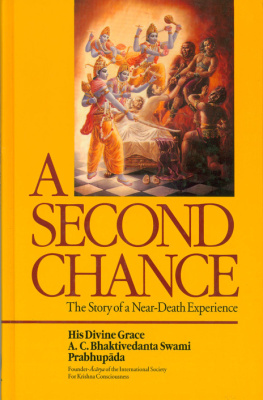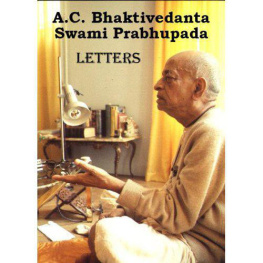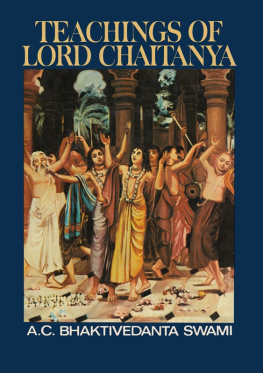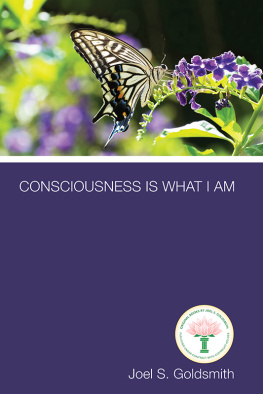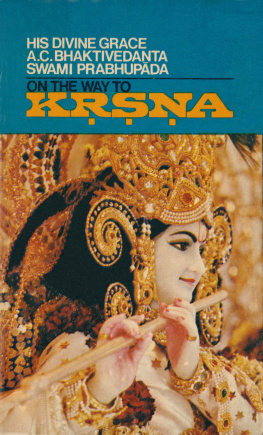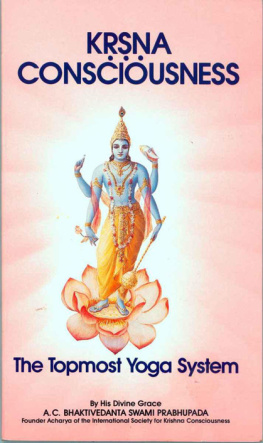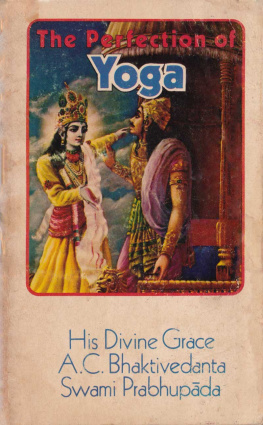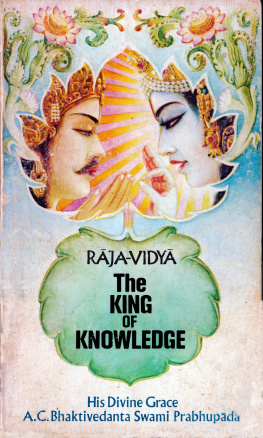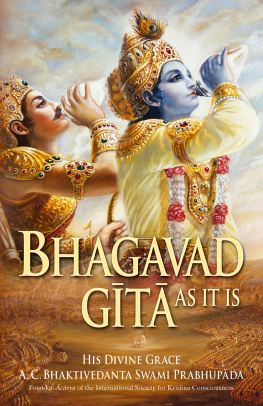Elevation to Ka Consciousness
EK 1: Choosing Human and Animal Lives
Chapter One
Choosing Human and Animal Lives
o ajna-timirndhasya
jnjana-alkay
cakur unmlita yena
tasmai r-gurave nama
"I offer my respectful obeisances unto my spiritual master, who has opened my eyes, blinded by the darkness of ignorance, with the torchlight of knowledge."
It is customary with this verse to offer obeisances to the spiritual master who enlightens his disciples in the matter of transcendental knowledge. The Vedic process does not involve research work. In mundane scholarship, we have to show our academic learning by some research, but the Vedic process is different. In the Vedic process the research work is already done; it is complete, and it is simply handed down by disciplic succession from teacher to student. There is no question of research work because the instruments and the means with which one conducts such research work are blunt and imperfect.
At this stage of our material existence, we are conditioned by many laws of nature. All conditioned souls are subject to four defects due to the imperfection of their senses. One defect is that the conditioned soul is certain to commit mistakes. There is no man who does not commit mistakes. In India, for instance, Mahtm Gandhi was supposed to be a very great personality, but he also committed mistakes. Five minutes before he came to the meeting at which he was killed, he was warned by confidential associates not to go, but he persisted. To commit mistakes is very natural in the conditioned state of life. Indeed, the popular saying has arisen: "To err is human."
Another imperfection of the conditioned soul is that he is sure to be illusioned. Being illusioned means accepting something which is not, phantasmagoria to be factual. Every one of us is under the impression that we are these bodies, but actually we are not. Accepting the body to be the self is called illusion, or my. The third imperfection is that conditioned souls have a tendency to cheat. We have often heard a storekeeper say, "Because you are my friend, I won't make any profit off you." But in actuality we know that he is making at least 50% profit. There are so many instances of this cheating propensity. There are also many examples of teachers who actually know nothing but put forth theories in words like "perhaps" or "it may be," while in actuality they are simply cheating their students. The fourth imperfection is that the senses of the living entity are not perfect. Our vision is so limited that we cannot see very far away nor very near. The eye can see only under certain conditions, and therefore it is understood that our vision is limited. Similarly, all our other senses are also limited. It is not possible to understand the unlimited by these imperfect, limited senses. The conclusion is that the Vedic process does not encourage us to endeavor to learn the Absolute Truth by employing our present senses, which are conditioned in so many ways. If we are to have knowledge, it must come from a superior source which is not conditioned by these four imperfections. That source is Ka. He is the supreme authority of Bhagavad-gt, and He is accepted as the perfect authority by so many saints and sages.
Those who are serious students of Vedic literature accept authority. Bhagavad-gt, for example, is not a scholarly presentation which arose out of so much research work. It is perfect knowledge that was taught by Lord Ka to Arjuna on the battlefield of Kuruketra, and we receive information from it that in previous ages r Ka also taught it to the sun-god Vivasvn, and it was handed down from time immemorial from Vivasvn by disciplic succession.
ima vivasvate yoga
proktavn aham avyayam
vivasvn manave prha
manur ikvkave 'bravt
"The Blessed Lord said: I instructed this imperishable science of yoga to the sun-god Vivasvn, and Vivasvn instructed it to Manu, the father of mankind, and Manu in turn instructed it to Ikvku." (Bg. 4.1)
If we study Bhagavad-gt according to academic knowledge or according to our own mental speculation, we are certain to commit mistakes. It is not possible to understand Bhagavad-gt in this way. It is necessary to follow carefully in the footsteps of Arjuna. In previous ages, due to interpretation and mental speculation, the real purport of Bhagavad-gt was lost; therefore Ka re-established the teachings by giving them to Arjuna.
eva parampar-prptam
ima rjarayo vidu
sa kleneha mahat
yogo naa parantapa
sa evya may te 'dya
yoga prokta purtana
bhakto 'si me sakh ceti
rahasya hy etad uttamam
"This supreme science was thus received through the chain of disciplic succession, and the saintly kings understood it in that way. But in course of time the succession was broken, and therefore the science as it is appears to be lost. That very ancient science of the relationship with the Supreme is today told by Me to you because you are My devotee as well as My friend; therefore, you can understand the transcendental mystery of this science." (Bg. 4.2,3)
Thus whoever follows in the footsteps of Arjuna, approaching Ka in a spirit of devotion, can understand the purpose of Bhagavad-gt as well as all other Vedic literatures.
There are four Vedas-Sma, g, Yajur and Atharva, and there are 108 Upaniads, including the opaniad, Kaha Upaniad and Taittirya Upaniad, as well as the Vednta-stra, rmad-Bhgavatam and Bhagavad-gt. These literatures are not meant for any particular class of men but for the totality of human society. All societies can take advantage of Vedic knowledge to perfect human life. As pointed out before, human life is not meant for sense gratification, but for understanding God, the universe and our own identity.
From Vedic literatures we can understand that this material world is only a partial manifestation of the complete creation of God. The larger portion of God's creation is found in the spiritual world of the Vaikuhas. Above and beyond this material nature there is a superior spiritual nature, as r Ka states in Bhagavad-gt:
bhmir po 'nalo vyu
kha mano buddhir eva ca
ahakra itya me
bhinn praktir aadh
apareyam itas tv any
prakti viddhi me parm
jva-bht mah-bho
yayeda dhryate jagat
"Earth, water, fire, air, ether, mind, intelligence, and false ego-altogether these eight comprise My separated material energies. Besides this inferior nature, O mighty Arjuna, there is a superior energy of Mine which is all living entities who are struggling with material nature and sustaining the universe." (Bg. 7.4,5)
There are many material universes clustered together, and all these universes constitute the material creation. Beyond these clusters of countless material universes is the spiritual sky, which is also mentioned in Bhagavad-gt.
na tad bhsayate sryo
na ako na pvaka
yad gatv na nivartante
tad dhma parama mama
"That abode of Mine is not illumined by the sun or moon, nor by electricity. And anyone who reaches it never comes back to this material world." (Bg. 15.6)
That superior nature which is beyond this material nature is eternal. There is no history of its ever having begun; it has neither beginning nor end.
paras tasmt tu bhvo 'nyo
'vyakto 'vyaktt santana
ya sa sarveu bhteu
nayatsu na vinayati
avyakto 'kara ity uktas
tam hu param gatim
ya prpya na nivartante
tad dhma parama mama
"There is another, eternal nature, which is transcendental to this manifested and non-manifested matter. It is supreme and is never annihilated. When all in this world is annihilated, that part remains as it is. That supreme status is called unmanifested and infallible, and is the highest destination. Going there, one never returns from that, My supreme abode." (Bg. 8.20,21)

